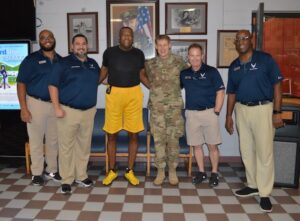
Story by Lori Newman
Brooke Army Medical Center Public Affairs
JOINT BASE SAN ANTONIO-FORT SAM HOUSTON, Texas. May 31, 2024 — A Brooke Army Medical Center trauma surgeon was working out at the Jimmy Brought Fitness Center on Joint Base San Antonio-Fort Sam Houston when something unexpected happened. The person on the treadmill in front of him collapsed.
“I was working the night trauma service and when I got off work, I went to the gym,” said Army Col. (Dr.) Chris Graybill. “I was on the treadmill and there was a gentleman in his late 60s who was in front of me. He was walking at a brisk pace and didn’t seem overly stressed. Then all a sudden he just stopped moving and the treadmill carried him backwards. He fell backwards and hit his head on my treadmill.”
Gym staff members Joseph Contreras and Jason Wylie quickly came to assist. U.S. Army veteran Darryl Aitch was wedged underneath the treadmill, so he had to be pulled out before Graybill and the gym staff could assess his condition.
“I thought immediately about him hitting his head and having a possible brain injury or hurting his neck, so I was trying to keep his neck immobilized and his airway open,” Graybill explained.
Aitch was unconscious and did not have a pulse. Contreras quickly retrieved the gym’s automated external defibrillator while Wylie called 911 and alerted Lucian Kimble, the fitness center manager.
Contreras and Graybill began administering CPR and Mykel Travis, assistant gym manager, helped with the AED.
“When we put the defibrator on it told us that his heart rhythm wasn’t organized, and he needed to be shocked,” Graybill said. It took a total of three shocks before Aitch started to breathe again.
“Very fortunately, after 10 or 12 minutes he woke up,” the doctor said. “EMS was there by then and by the time he had left the gym on a stretcher he was asking questions. One of the prime concerns when your heart stops is that you are not getting blood flow to the brain. For him to wake up and start talking was fantastic.”
Graybill praised the gym staff for their quick reaction. “They did an awesome job.”
Kimble said the fitness center staff completed Adult First Aid/CPR/AED training in February. “If it wasn’t for Joseph’s responsiveness and CPR administration skills, we could be looking at a different outcome. I was so proud of these guys.”
Travis agrees. He said it was a life-changing event for him.
“When all this was going on, everything was happening like clockwork,” Travis said. “We had renewed our training a few months ago, so our training kicked in. Unfortunately, it had to happen to you (Aitch). But, part of that is why you’re still here.”
Graybill was able to visit Aitch at BAMC later that evening.
“(Aitch’s) family was there and he was able to hold complex conversations,” Graybill said. “Fortunately, he remembered nothing because CPR hurts and getting shocked hurts. It is not an experience one would want to remember.”
Aitch thanked the people who helped save him. He simply said, “I love all you guys.”
“I don’t think it’s a testament to me,” Aitch said. “I think it’s a testament for someone else. I have strength in my beliefs, and I think what happened to me wasn’t about me. That was about somebody else to see or to overcome.”
“No matter what conditions we suffer on this earth, it’s a learning experience, no matter what we go through,” he added “I’m going to overcome this. It’s mind over matter.”
The trauma doctor noted that it’s not uncommon for BAMC staff to do CPR and use a defibrillator in the emergency department or the intensive care unit, because everyone is prepared to do it. “You’re just not expecting to do that on the street,” he said.
Graybill suggests that people take a Basic Life Support course and learn CPR so if something happens, they know what to do. He also praised Holly Ortega, BAMC nurse educator, and the hospital education team for all they do in teaching basic lifesaver courses.
“When you are able to save someone, it’s not just about saving a life, it’s about giving them a meaningful quality of life after they are injured,” he said. “When that does happen, it is extremely gratifying. (In trauma medicine), we get to see what we do immediately.”
Aitch said he’s ready to get back in the gym and start running again.
“All of us are going to die one day, so why would I sit around worrying about dying?” he said. “I’m worrying about living.”